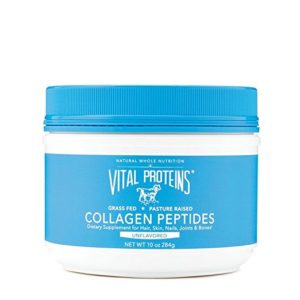You’ve probably heard that collagen is great for hair, skin and nails. And chances are, collagen is in at least one of your skincare products. But what is it exactly, and how can you make sure you’re getting enough of it for young, radiant skin? One sure way is to consume it as part of your daily diet. And these are five easy ways to do so.
According to Kellyann Petrucci, M.S., N.D., “Collagen is one of the most common proteins in the body.” And as a major building block in the human body, collagen plays many important roles, including “maintaining skin elasticity.”
And since collagen production starts to decrease as we age, it’s imperative to get enough of it for healthy, vibrant and hydrated skin. But apart from beauty products, there are five dietary options, and they’re all based around collagen powder.
Collagen powder is an animal protein and it’s made from bovine cartilage, that is beef collagen. It is a tasteless powder that dissolves in liquid, making it easy to incorporate into just about any drink or meal without you even noticing it.
If you’re not sure where to find a good source of collagen, here’s a great product:
Vital Proteins Pasture-Raised, Grass-Fed Collagen Peptides
Price: $25.00

Source: www.amazon.com
Here are five ways to incorporate collagen powder into your diet
Drink it
Add 1 to 2 tablespoons of collagen to your coffee, hot or iced.
Eat it
Add 1 to 2 tablespoons of collagen to a warm bowl of soup. This works great for chilled soups, too.
Blend it
If you enjoy a morning smoothie, add a couple tablespoons of collagen to your favorite recipe.
Bake it
You can easily add a couple tablespoons to your next baked good It won’t change flavor, consistency or baking times.
Use it in cooking
Collagen is a natural thickening substance, so, if you’re making gravy, jello or pudding, collagen is a great way to have this skin-friendly protein.




